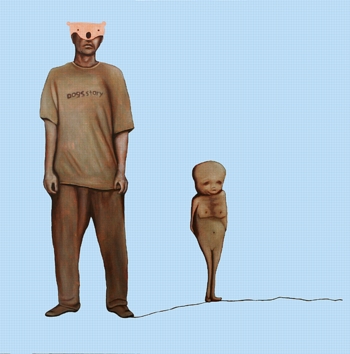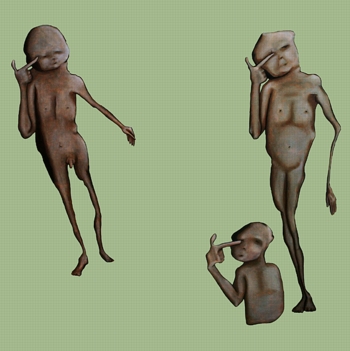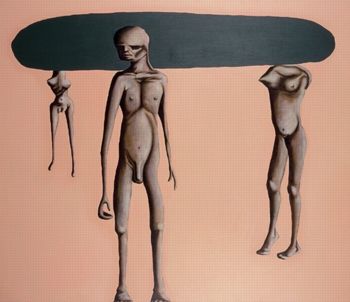 December 06
December 06
The Unadulterated Projectionist
David Stromberg

Book I: A Journal of Mistaken Philosophies
It was some forty-five years ago, just as my parents disappeared, that the Scheinhorn family sent me a correspondence by mail, a postcard informing me of the family's arrangement for me of the row house where I now live, inviting me to relocate here by a certain date, as the new owners of the home I was then inhabiting would be moving in shortly.
About a year ago, the family sent me a second postcard: "In celebration of your sixty-third birthday, the Scheinhorn family extends its far-reaching arms with hugs and kisses to wish you health and happiness. The family is proud of your real-estate investment choice at Graznaya Ulitsa 6, and wants to add it to our family owned buildings already managed under the trusted umbrella of Scheinhorn Properties. As a token of our love, we would like to offer you the generous advance sum of 413,890,000 Lei (EUR 10,000) for the purchase of your property, which we feel would be well managed by our professional real estate office. To demonstrate our goodwill, we additionally offer you 20% of all future income, whether we sell or lease the property. We hope you will consider the family solidarity that Scheinhorn Properties had perpetuated for over sixty years, before 1947 and for these years since the return of our properties. We all look forward to your swift reply." Why would the Scheinhorn family be willing to invest ten thousand Euro in a property for which I paid two thousand? You can be sure it's not because I made a good investment; it's because I took my bad investment and put a worse thing it, leaving them with no option but to buy me out and close me down.
Just as where I saw an ambiguous practice of freedom and experimentation, the Scheinhorn family accused my of supporting hedonistic lechery, so it had happened even with my work, so that while Yana - my sweetest and most perfected goddaughter, my haunting ever-present absence - while she might have detected humor and playfulness in a certain phrase, the Scheinhorn family imposed a subversive interpretation and complained that my derelict theories aimed to dismantle the well-functioning social structures of our town, giving voice to the vagrants that hung around the industrial area of town, undermining the safety and righteousness of the people who worked there.
Never did I expect - I say this honestly - that Janos, my not-always-virtuous tenant, would edit some of my shorter articles, which I gave him just so that he would know where his payments of 30 Euro per week was going, into a pamphlet that he would distribute to the "vagrants" hanging in and around his industrial studio; and never did I imagine that these people, both those that took part in his photo shoots and those that were interested only in the shelter of the unlocked work-shacks, would find in my words a future for themselves, a hope, a voice that spoke directly to their experience, lowly as it may have been. The idea that a man sitting not uncomfortably in the same row-house for forty-five years had anything of interest to say to men and women, young and old, spending their days drinking in the forest of firs and nights drinking in the forest of factories, was more than bewildering - it was a fluke. There are moments when a certain group of people is ready for change, consciously or not, and it takes little more than a roughly relevant combination of words and positions to rouse them. The arguments happen to function as the ideological backboard of their actions. Please understand, I wasn't unhappy with this unexpected notability - there was an audience for my work, and the farther away that audience was from the Scheinhorn family, the more I felt like I had succeeded in something. But it was difficult to take the credit for being the sole motivational force behind a select group of vagrants that started crossing the highway and moving into the more central areas of Berezino, until the pubs in the once-exclusive center were patronized by already-drunk forest dwellers as often as by the clean and ostensibly-sober townsfolk; and, though I would love nothing more, it would be gratuitous to claim that, after some townsfolk approached the vagrants and unkindly asked them to leave, they would have hastily retreated but for being able to quote some small passage from one of my pamphlets, saying, for example, "Do you know what Schneier Scheinhorn writes about impoliteness? He says that, since the word im-polite is the negation of polite, anyone capable of being impolite is capable of being polite. He also says that someone who is rude cannot be polite, since the two attitudes are in downright opposition to each other. Now, tell me, which are you, impolite or rude?"
Book II: This Moment On
The following week was a cold one for sweaterless Sherman. With no job, he roved aimlessly within the confines of his neighborhood, which, during his absence of two months, had been extensively transformed. The metamorphosis was comprised not of new facades to old structures, not of architectural face-lifts to chafed and eroded shop-signs, but of a deviation in the nature of the establishments, in the neighborhood's fundamental function. A year in the making, the approaching change, heretofore hidden behind construction fences and temporary false storefronts, had obstructed the day-to-day activities under the guise of later alleviating them, never hinting at their actual endangerment. Now exposed, the change became not only visible, but brandished its conquest of the neighborhood, its having undermined what the neighborhood had been through its veiled, inconspicuous growth.
 It had been the case for many decades before that the Fairfax area sustained a working-class population, primarily Jews, with markets, book stores, import shops; large empty parking lots where young people, taught by their parents, could practice early phases of driving; synagogues and Hassidic schools; cafes, delis, pizza parlors, bakeries, bagel shops. American Hassidic Jews lived in a residential area not far from businesses run by secular Israeli Jews who were supported by elderly Russian Jews holed up in subsidized apartments and retirement homes up and down Fairfax. The neighborhood had never gone unengaged, never gone unpatronized, but the businesses and their clients had fallen into a routine, a familiar ritual where money no longer drove their interactions, and new, unexpected clients rarely seemed to find their way into the shops. Being located in the middle of the centerless city, the Fairfax area saw the cars of countless people - driving from Eastside to Westside, from Mid-Wilshire to the Laurel Canyon, from Beverly Hills to Silver Lake to Downtown - pass through on a daily basis; and yet, except when they were headed for historically popular spots, like Canter's Deli, or Stephano's Pizza, very few people made essential use of the neighborhood.
It had been the case for many decades before that the Fairfax area sustained a working-class population, primarily Jews, with markets, book stores, import shops; large empty parking lots where young people, taught by their parents, could practice early phases of driving; synagogues and Hassidic schools; cafes, delis, pizza parlors, bakeries, bagel shops. American Hassidic Jews lived in a residential area not far from businesses run by secular Israeli Jews who were supported by elderly Russian Jews holed up in subsidized apartments and retirement homes up and down Fairfax. The neighborhood had never gone unengaged, never gone unpatronized, but the businesses and their clients had fallen into a routine, a familiar ritual where money no longer drove their interactions, and new, unexpected clients rarely seemed to find their way into the shops. Being located in the middle of the centerless city, the Fairfax area saw the cars of countless people - driving from Eastside to Westside, from Mid-Wilshire to the Laurel Canyon, from Beverly Hills to Silver Lake to Downtown - pass through on a daily basis; and yet, except when they were headed for historically popular spots, like Canter's Deli, or Stephano's Pizza, very few people made essential use of the neighborhood.
Not that the businesses voiced protests against this. Opened, maintained, and operated by immigrants and their children, the shops survived on their own terms, not making a killing and barely making a living, but able to combine the place where they had come from with the place they were now in, continuing their past lives at the same time as starting new ones - and allowing others in the neighborhood to do the same.
But to the building owners and investment speculators, each person who drove through the neighborhood without stopping was a squandered customer, because people spend money, even when they don't have money to spend, and if they aren't spending it at your place, you can be sure they're spending it somewhere else. And to lure this money, there needed to be made to the neighborhood some auspicious, cataclysmic, rupturing metamorphoses. Expansive closed-off shopping complexes, separated from the street by the girth of the structure itself, had to be erected. Within the confines of these complex, open-air pedestrian walkways and courtyards - made to look ambiguously old-fashioned, modeled after some current conception of century-old civilized urbanism - had to be surrounded by familiar shopping cartels - not Bubele's but Burberry's, not Haim's but Hermès. Parking structures had to be constructed, entangled systems of time-measurement had to be devised and instituted - you can park in this section for free for this long if you buy something in this section, and if you park there you can stay longer but you have to buy in that section, and make sure to get a little stamp that says in which section you bought something, so we know to which section you went, in fact, maybe you don't have to bother going to the second section, it's really not as interesting, and you'll probably be happier spending in the first. The whole place had to be stuffed fat with a variety of modes of spending - food, clothes, entertainment, education, electronics - the entire spectrum of shopping-by-category encased in a single hermitage. The neighborhood had to be made difficult to get to, maneuver through, and get out of. Then people would come to spend. The way things had been was too easy. The neighborhood had gone unnoticed precisely because it was so available to everyone, because it offered no sense of exclusivity, no feeling of specialness. The neighborhood as it had been precluded the fantasy of being anything more than one's own person; and, as people believed they deserved to feel special while spending money, making someone overly aware of being one in a multitude hadn't sold enough.

Book III: Reins on a Bucking Guilt
Trudging up the steep trench, from the train tracks through the damp dirt to the brown-green pasture above, not without a few minor slips that left streaks of mud above the soles of his shoes, Boris regained his balance and took survey of the scene: Down below him, people's heads hanging out of the train cabin windows, a small group lining the valley of the trench, sitting on plastic bags they'd laid onto the damp grass, some smoking, others snacking; further out on the pasture several couples had taken the opportunity for a hand in hand walk through the countryside. Boris sauntered alongside the train towards the engine car, where he saw eight or ten people, some in jeans and t-shirts, some in slacks and rolled up sleeves, one wearing a frayed skirt - all pulling the dead brown cow, left across the tracks, up the incline by its legs. As he neared the locus of the crisis, Boris beheld the supposed defilement of the cow: Its skin had been cleaved at, yes, but in multitudinous lines and angles, so that if someone recognized in there a Swastika or a Cross or a Star of David, or any other political or religious emblem, they did so with purely personal and mysterious motives.
The train had been blocked for more than forty-five minutes, Boris still had three or four hours of traveling ahead of him - at this point, it was possible even that he had missed all his connections and would not reach his destination today at all - and the cow was still only halfway up the hill. The effort of pulling it up was so visibly fierce - for every intense heave and ho and pull that they managed, the cow moved an inch or two - that Boris wondered if it wouldn't have taken less time simply to slice the thing up, light a bonfire, and congregate the entirety of the train's hoi polloi for an impromptu barbecue. The skeleton and its innards could then be easily moved off the tracks, and the train, now full of sated passengers, could continue on its way. But who knew - maybe nobody except Boris was getting hungry.
Turning away from the hubbub, Boris spotted a lone, large, low-branched birch tree in the distance, and walked in its direction with the idea of climbing it, his mind disburdened from the crisis as the din he left behind no longer distracted him with its associations and preoccupations. The sky was still filled with a bevy of varying gray swaths, from dark streaks of almost black to patches of white turning blue, and a spotty bright light gave portions of the lackluster grass a refurbished aura, a persevering vitality that turned flat brown into saturated gold and dull olive into lush green, so that, in certain parts, the landscape was imbued with a deep assurance in some independent, tenacious, unshakable rightness.
Approaching the tree, Boris saw that its branches were higher than they'd looked from afar - his mood at that point not one that, in answer to a brash urge to sit on the tree, propelled him to actually set about climbing it - and instead he leaned up against it, resting his right arm up on the nearest knot, facing away from the event on the tracks, looking out at the undeveloped acreage, at what looked to the eye, despite his awareness of the world's general overpopulation, like an overabundance of perfectly habitable space, a section of land within Germany's borders that not even Germany had yet conquered. Hitler could have inhabited this land, Boris thought, having taken control of Germany after things hadn't work out according to his hopes or intentions in Austria. Instead, before he'd even really surveyed and settled this place, unable to actually occupy the land he had somehow acquired, he set out for more, tried to conquer the rest of Europe. Of course! Any such person uncomfortable and dissatisfied with his own home, any such person unable to find prosperity or subsistence on his society's preexisting terms, might have the brute reaction of moving and imposing his twisted personal vision of home - a home of his own invention - somewhere else, where people could not recognize the person's private perversion. Where one's essential aberrance was diffused by outward oddity, allowing one to sidestep the failure of distinguishing oneself within one's own society by thriving in an alien society in which one's distinction was tolerated as a part of, even attributed to, a less specific, innocuous preternaturalness. And maybe, had Hitler not succeeded in mobilizing this foreign country behind him - a country that historically had aimed for the kind of logic and efficiency that he did in fact provide - maybe he would have finally found himself at a pasture such as this one, his own train stranded by a slaughtered cow, and, tired of perpetual dislocation and alienation, settled for a territory he could see rather than an empire he could barely imagine.










